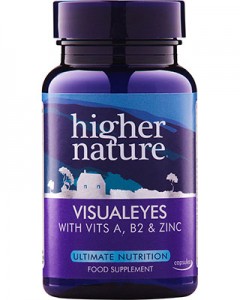It may come as no surprise to you, but research suggests sight is the sense we’re afraid of losing most. For many of us, the idea of only being able to connect with the world through speech, hearing, touch, smell and taste is a fearful one indeed – and for very good reason. Perhaps preventing sight loss should be something we’re more concerned with then. Regular sight tests play a crucial role in keeping tabs on our eye health, obviously, but we can take other, simple steps to help out our peelers.
The vast majority of us are aware of how good regular exercise is for our bodies – aiding weight control and heart health, among many other things – but, because it also helps prevent high blood pressure and thus hardening of the arteries, exercise ultimately too plays a role in keeping our eyes healthy. Better known, though, is the benefit of sun protective eyewear, of course, which can guard eyes from the harmful effects of the sun’s ultraviolet (UV) light rays. However, a too rarely considered contributor to good eye health is a sensible diet – in fact fewer than 60% of people in the UK are aware of the positive effects good nutrition has on their eyesight1. So, more specifically, what don’t they know?
Sugar bad; whole foods good
Age-related macular degeneration (AMD) is very bad news for eyes; basically, it causes them to degenerate in later life. And it’s aided by unnecessary, excess fat in your blood, which affects the optic nerve, lens and delicate tissues of your eyes. Yet a diet that avoids such fats, cutting out then refined carbohydrates like white bread, white rice and high-sugar sweets, can help2. Adopting such a diet that focuses on low-glycemic index (GI) foods is highly advisable to prevent sight loss, such as whole grain foods, whole fruits, high fibre beans and vegetables and proteins. Obviously, over consumption of sugar-rich foods also leaves one open to the risk of developing type 2 diabetes, a result of which can be that high blood sugar impacts on the eyes’ blood vessels, potentially causing blurred vision and, yes, eventual sight loss.
Awesome Omega-3
To be fair, Omega-3 has been long promoted as a terrific source to support eye health – and for good reason. Indeed, it’s been discovered that just one portion of Omega-3-rich, oily fish a week may reduce the chance of developing AMD by 40%3. While you let that fact settle in, consider why these polyunsaturated fatty acids are so good for the eye – they reduce glaucoma risk, aid effective drainage of intraocular fluid and support the physical strength of cell membranes. Food-wise, you’re best opting for oily fish like sardines, salmon and rainbow trout to get your Omega-3 fix.
Excellent antioxidants
Antioxidants are critical to our body’s gastrointestinal system because they help ensure stored food doesn’t deteriorate before all its goodness is removed. To that end, it’s maybe unsurprising, when you think about it, that eating foods containing antioxidant nutrients appears to lower AMD rates4. In particular, two plant-based cartenoids called lutein and zeaxanthin possess potent antioxidant properties and are commonly believed to greatly aid eye health – research suggests following a diet that features foods rich in them both cuts the risk of AMD development by 35%5. Indeed, experts suspect that lutein and zeaxanthin not only aid eyes in filtering UV light but also help defend the retina from any damage. For foods specifically rich in both nutrients, turn to green leafy vegetables such as kale, spinach, collards, lettuce and broccoli.
Supplements
Finally, if the prospect of basing your diet around whole foods and high-fibre foods, green vegetables or oily fish is either not practical or fills you with dread (for whatever reason), then there is another option to help ensure good eye health via nutrition – supplementation. The following eye health supplements are available through The Finchley Clinic and, naturally, we highly recommend them all:
Omega 3 Fish Oil (180, 90 and 30 capsules) – contains eicosapentaenoic acid (EPA) and docosahexaenoic acid (DHA); together they promote normal heart function, while DHA supports eye and brain health.
Complete Omegas 3:6:7:9 (240, 180, 90 and 30 capsules) – a product packed with Omega 3, 6, 7 and 9 oils derived from fish, starflower, sea buckthorn and virgin olive oils (thus providing EPA, DHA and gamma-linolenic acid or GLA).
VisualEyes (30 capsules) – this supplement is rich in lutein, zeaxanthin, selenium, zinc and Vitamins A, B2, C and E.
References
1. Eyecare Trust ‘Healthy Eyes Report’.
2. Mares J.A. and Moeller S.M. ‘Diet and age-related macular degeneration: expanding our view’. Am J Clin Nutr. 83:4 pp. 733-734.
3. van Leeuwen R., Boekhoorn S., Vingerling J.R., et al. ‘Dietary intake of antioxidants and risk of age-related macular degeneration’. JAMA. 2005; 294:3101–7.
4. SanGiovanni J. P. ‘The Relationship of Dietary Carotenoid and Vitamin A, E, and C Intake With Age-Related Macular Degeneration in a Case-Control Study’. Archives of Ophthalmology. September 2007, Vol. 125 No. 9.
5. Seddon J.M., Cote J. and Rosner B. ‘Progression of age-related macular degeneration: association with dietary fat, transunsaturated fat, nuts, and fish intake’. Arch Ophthalmol. 2003; 121:1728–37.

